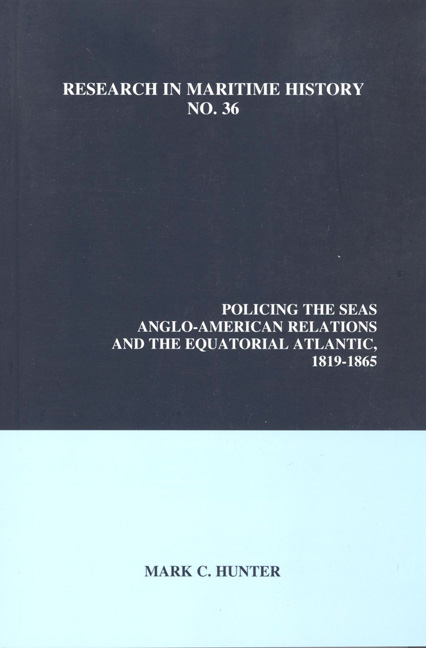Book contents
- Frontmatter
- Contents
- List of Tables
- List of Illustrations
- About the Author
- Acknowledgements
- Chapter 1 Introduction
- Chapter 2 The Atlantic
- Chapter 3 Anglo-American Policymaking, 1819-1834
- Chapter 4 Naval Relations and the Suppression of Piracy and Slaving, 1820-1830
- Chapter 5 A Naval Compromise, 1830-1842
- Chapter 6 The Royal Navy and West Africa, 1843-1857
- Chapter 7 The US Navy and West Africa, 1843-1857
- Chapter 8 Conflict Avoidance in the Equatorial Atlantic
- Chapter 9 The Civil War and Conflict Resolution in the Equatorial Atlantic
- Select Bibliography
Chapter 9 - The Civil War and Conflict Resolution in the Equatorial Atlantic
- Frontmatter
- Contents
- List of Tables
- List of Illustrations
- About the Author
- Acknowledgements
- Chapter 1 Introduction
- Chapter 2 The Atlantic
- Chapter 3 Anglo-American Policymaking, 1819-1834
- Chapter 4 Naval Relations and the Suppression of Piracy and Slaving, 1820-1830
- Chapter 5 A Naval Compromise, 1830-1842
- Chapter 6 The Royal Navy and West Africa, 1843-1857
- Chapter 7 The US Navy and West Africa, 1843-1857
- Chapter 8 Conflict Avoidance in the Equatorial Atlantic
- Chapter 9 The Civil War and Conflict Resolution in the Equatorial Atlantic
- Select Bibliography
Summary
The British did not see the coming of the US Civil War because they judged it more likely that the Americans would continue to emphasize expansion rather than becoming embroiled in an internal conflict. Palmerston tolerated the US and believed that its expansion to the south would provide regional stability and a people with a “gentlemanly” ethos with whom Britain could deal. Moreover, if the US did this it would reduce the possibility that it would plot to annex British North America. Edward Steele concluded that “the second Palmerston government, like the preceding Tory administration, carried appeasement of the United States to lengths scarcely imaginable[.]” But with the storm clouds gathering, the new Confederate States of America (CSA) caused a problem. The Foreign Office warned the Admiralty to act with caution, an approach that best suited British interests.
Similarly, the US reconciled its maritime difficulties with Britain so it could focus on the war effort. Washington granted London the right to search suspected US slavers, but the British remained cautious lest it be dragged into the Civil War. To avoid any future conflict over the application of sea power, both nations agreed on passports for vessels involved in the legitimate transport of Africans. Across the equatorial Atlantic, the role of sea power was modified during this tense era. Anglo-American naval operations in the equatorial Atlantic were flexible because neither side wanted to expand the war.
As the US came fragmented, Britain sough to remain neutral while protecting its maritime interests. The election of Abraham Lincoln made British financial circles uneasy, and the “gentlemanly capitalists” were deeply concerned that the divisions between North and South would injure their economic interests. They wanted peace maintained and urged the British government to try to broker a settlement between Washington and Richmond, the capital of the new CSA.
Thomas Baring, former Lord of the Admiralty and Liberal MP, reflected these concerns, for the Barings were worried that any long-term conflict would affect their bottom line. On 21 December 1860 Lord Russell, then Prime Minister Palmerston's Foreign Secretary, explained to Baring that “Lord Palmerston & I think it would be very unsafe for us to mediate in American affairs, unless we were called upon by both parties to do so - & even then we should be unwilling.”
- Type
- Chapter
- Information
- Policing the SeasAnglo-American Relations and the Equatorial Atlantic, 1819-1865, pp. 227 - 242Publisher: Liverpool University PressPrint publication year: 2008



